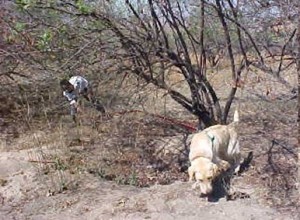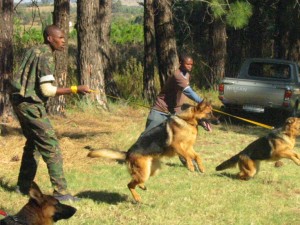Policy and Philosophy
Training programmes are implemented and maintained to entrench the concepts and philosophies that drives training in a professional and successful training environment.
Socialization of young dogs – Puppy Training
One of the most important phases in a dog’s development is when it is between the ages of 12 and 16 weeks old, during which a socialization process must take place that will determine the course of all further development of your dog.
Training a dog is like building a house: One should start at the foundation. Therefore we strongly recommend Braveheart Bio-Dog Academy’s scientific socialization – puppy training for dogs between 12 and 16 weeks old.
The socialisation process is designed to develop a balanced relationship between the dog and humans, and between the dog and other dogs and animals.
What results can you expect from our socialization – puppy training?
- The foundation is laid for life-long self-confidence of the dog.
- Basic control by you and obedience by the dog are created during the socialisation process.
- The dog develops the ability to react correctly to instructions.
- Harmony is created between the dog and humans as well as other dogs and animals inhabiting its living space, resulting in a well balanced dog.
When you come to fetch the dog at Braveheart Bio-Dog Academy after completion of the socialisation process, you are also taught how to handle the dog correctly, and to give continuous development training at home. This takes up approximately 30 minutes.
Socialization – puppy training normally takes over a period of 2 weeks at our Academy, just east of Pretoria.
Socialisation is of course also the ideal prelude to advanced training when your dog has reached the right age.

We professionally socialize puppies
Personal Protection And Obedience Training
Trained dogs save lives. Through years of experience, and with excellent personnel our training eliminates the barriers in the relationship between man and dog. A Braveheart trained dog becomes a friend, companion, family member, and protector – not an unpredictable killing machine to be locked behind high fences to keep it under control.
The fist step in personal protection training is to create clear communication between owner and dog, ensuring obedience. Our personal protection training ensures that you will be able to exercise full control over the dog, even from a distance. The dog must also be able to work on its own, even when its minder is not with it. Natural aggression plays an important role – we do not teach the dog to attack; we bring out its natural aggression. A dog is a territorial animal – this includes the people populating its world. A Braveheart trained dog will protect you because it wants to, not because it has to. The purpose of our personal protection training is therefore to blend the dog and its “family” into one integral unit, and ensure obedience.
Our Academy is accredited with PSIRA, and on completion of training we issue a formal Certificate of Competence as well as a warning board to install at your premises.
Attack Dog Training Photo: Felix Dlangamandla/Beeld Newspaper
We train Family Dogs for Personal Protection
Tracker Dogs
Tracking does not come naturally to dogs – a suitable dog must be trained specifically for tracking – and the effectiveness of a tracking dog to a large extent depends on the quality of training received by the dog, by its handler, and by them as a team.
Braveheart Bio-Dog Academy’s handler training includes assessing a scene for possible tracks; providing a scent to a tracker dog; preparing the tracker dog to follow a scent; utilizing the dog to follow the scent track; and to locate and identify a suspect or animal that was being followed.
Tracker dogs must be well trained in obedience, with or without aggression work (depending on the client’s requirements). Tracks of various lengths and time of scent trail form part of the training.
As mentioned, the success of the use of tracker dogs depends in the first place on the handler being well trained with his tracker dog.
Braveheart Bio-Dog Academy has done extensive research on this aspect of dog training, striving to minimize false indications, and to accommodate continuation training.
NB: There is no specific breed of dog that is most suitable for tracking – vastly different breeds can be trained to become tracking dogs (Around 2006, the best tracker dog at Braveheart Bio-Dog Academy was Mamba, a crossbreed dachshund).

We successfully train dogs for Tracking
Patrol Dogs
Patrol dogs must be trained to the minimum standard as per PSIRA legislation. The dogs must be trained to perform their tasks of detecting intruders and protecting their handlers.
DH4 Handlers and Dogs in Training
Standards of patrol dogs DH4
- Heel course with all changes of direction on and off leash
- Distance control at 10 metres (dog to follow sit and down commands)
- Stay in any of the above positions for 3 minutes at 10 metres
- Recall of dog, the handler to be approximately 10 metres away
- Area search in building or open area
- Be able to negotiate natural and unnatural obstacles according to the specific needs
We train Patrol Dog’s – Professionally
Detection Dogs
Dogs Trained And Sold
The dog breeds below amongst others can be successfully trained for the following duties:
- Patrol
- Personal Protection
- Tracker
- Substance – Detection
- Explosives
- Narcotics
- Ecological Products
Some of the dog breeds successfully trained by Braveheart Bio Dog Academy :


